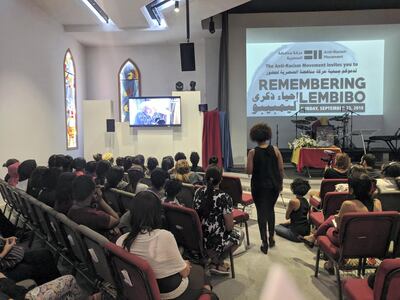The mysterious death of an Ethiopian woman in Lebanon has reopened a debate on the treatment of domestic workers in the country, with activists calling for DNA tests to identify a possible suspect.
The woman, known only as Lembibo, was found dead last month in a swimming pool at the home of her recruitment agent. Authorities have not made any arrests over the 26-year-old’s death, but activists suspect foul play.
The case has sparked anger in Lebanon, where as many as two migrant domestic workers die each week, mostly by committing suicide or in accidents when attempting to run away from employers, often by jumping from balconies.
“Lembibo is not the first migrant domestic worker to die in mysterious circumstances and for nothing to happen,” said Rahaf Dandash, coordinator at the Migrant Community Centre in Beirut.
“Racism is so entrenched in the Lebanese community and we just don’t want to talk about it."
An estimated 200,000 migrant domestic workers live in Lebanon officially, most of them from Ethiopia, Sri Lanka, the Philippines and Nepal. They arrive in hope of earning money to send back to their families at home.
Reports of non-payment of wages, deprivation of movement, and physical and sexual abuse are increasing, and dozens run away from their employers every week.

Little is known about Lembibo, not even her last name. An investigation by the local Al Jadeed television station said she came to Lebanon from Ethiopia on December 25 last year. Months after arriving in the town of Dweir to work in the home of an elderly couple, they discovered she was pregnant.
The employers called the agent and asked him to send her home. But before he could, Lembibo was taken to hospital. Her baby was delivered, but died just two hours later due to birth defects, the report said.
Lembibo returned to her employers from the hospital, but she was soon collected by the agent and taken to his home. She was found dead the following day.
The Ethiopian embassy said it was told that Lembibo had drowned in a private swimming pool, but little else.
Campaigners do not believe they have the full story. The case has been taken up by the Lebanese trade union syndicate, Fenasol. The organisation’s president, Castro Abdallah, said witnesses had heard a row between the agent and Lembibo.
"We have been informed that neighbours reported they heard several times shouting from the agent towards the worker," he told The National.
Questions have also been raised about a video — broadcast by Al Jadeed — that allegedly showed Lembibo being collected from her employer’s house by the agent. The video shows Lembibo on her knees, crying and calling out for her baby.
Activists have suggested that Lembibo may have been raped and become pregnant after her arrival, and have called for a DNA test to determine paternity. Lebanon’s Anti Racism Movement said in a statement: "There is a strong chance she got pregnant here. A DNA test is important to identify the father of Lembibo's baby.”
Mr Abdallah, the trade union leader, also called for a DNA test.
The footage of Lembibo calling for her child was shown to a tearful church group of about 200 mourners at a memorial to mark her death in the Beirut suburb of Hazmieh on Sunday.
“There are so many questions without answers. Or maybe the answers are right there if someone cares to look,” said Banchyi, an Ethiopian community leader, addressing a crowded room at the Resurrection Church.
“We do not want Lembibo to be just another statistic, her death unmarked. Another Ethiopian ‘suicide.’ A generation of young women is being lost."
This case has added to a sense among migrant domestic workers that crimes committed against them go unpunished in Lebanon.
“It is not fair that she died like this,” said Lea, an Ethiopian, outside the church. “We have no one to speak for us, no one to protect us.”
“Ethiopians are very used to the problem, to suicide and death, and they cannot say anything,” said Bizuayhou Sisay, another Ethiopian migrant worker. “Death has become normal just as it is for Syrians, and it doesn’t lead to anything.”
____________
Read more:
Lebanon closes case of Ethiopian maid who jumped from employers' home
Couple to hang for murder of Filipina maid in Kuwait
Domestic workers still face 'abuse and fraud' in the Middle East, UN says
____________
Ms Dandash, of the Migrant Community Centre, said endemic racism is to blame for a lack of action on the high number of deaths.
Between January 2016 and April last year, the bodies of 138 migrant domestic workers were repatriated, according to numbers provided to IRIN news agency by Lebanese General Security. The causes of death were not given.
“When you have at least 50 migrant domestic workers dying every year, shouldn't we ask why this is happening?" Ms Dandash said. "But we don't.”

